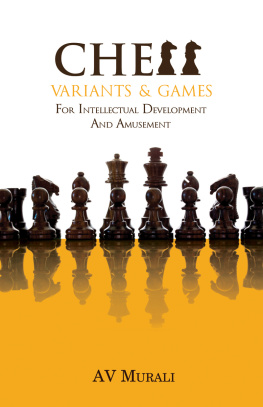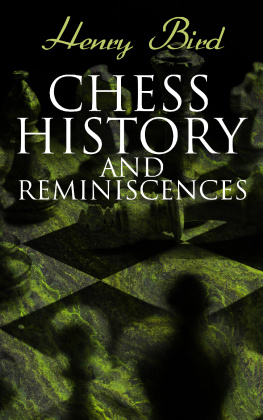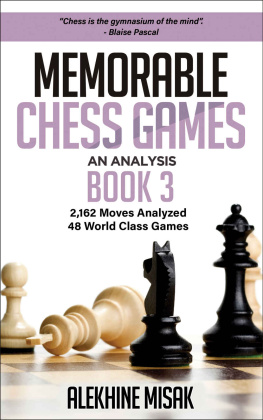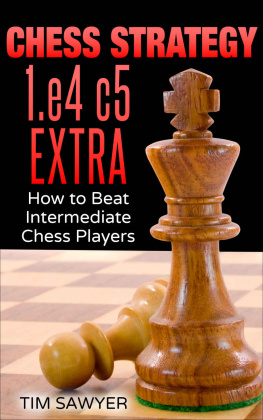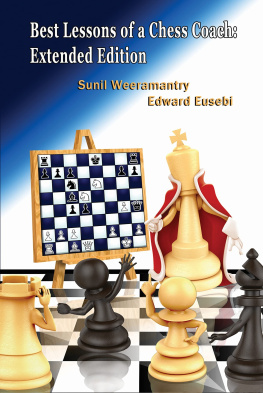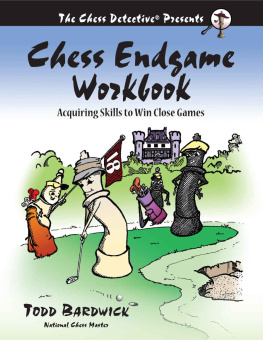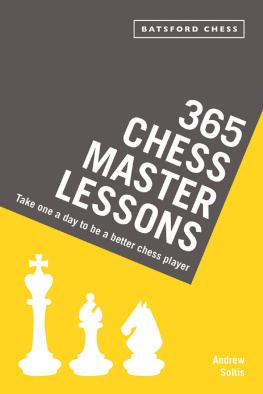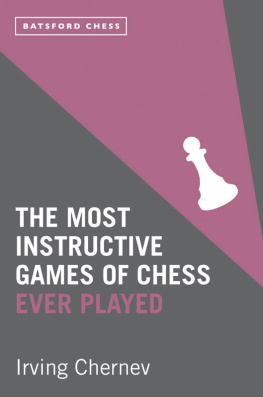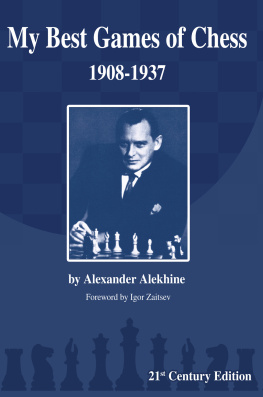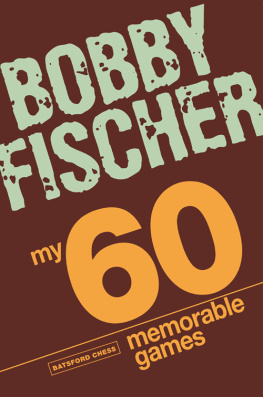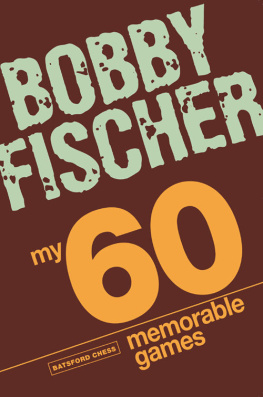The Mammoth Book of The Worlds Greatest Chess Games
Graham Burgess, John Nunn and John Emms
Foreword by World Champion Vishy Anand

Contents
by World Champion Vishy Anand
McDonnell Labourdonnais, 1834
Anderssen Kieseritzky, 1851
Anderssen Dufresne, 1852
Zukertort Blackburne, 1883
Steinitz Chigorin, 1892
Steinitz von Bardeleben, 1895
Pillsbury Em. Lasker, 1895/6
Steinitz Em. Lasker, 1895/6
Pillsbury Em. Lasker, 1896
Em. Lasker Napier, 1904
Rotlewi Rubinstein, 1907/8
Rubinstein Em. Lasker, 1909
O. Bernstein Capablanca, 1914
Nimzowitsch Tarrasch, 1914
Capablanca Marshall, 1918
E. Adams C. Torre, 1920
Em. Lasker Capablanca, 1921
Maroczy Tartakower, 1922
Smisch Nimzowitsch, 1923
Grnfeld Alekhine, 1923
Capablanca Tartakower, 1924
Rti Bogoljubow, 1924
Rti Alekhine, 1925
Rubinstein Alekhine, 1926
P. Johner Nimzowitsch, 1926
Capablanca Spielmann, 1927
Alekhine Maroczy, 1931
Rauzer Botvinnik, 1933
Botvinnik Capablanca, 1938
Euwe Keres, 1939/40
Geller Euwe, 1953
Euwe Najdorf, 1953
Averbakh Kotov, 1953
Keres Smyslov, 1953
Botvinnik Smyslov, 1954
Keres Szabo, 1955
Bronstein Keres, 1955
D. Byrne Fischer, 1956
Tal Koblencs, 1957
Polugaevsky Nezhmetdinov, 1958
Tal Fischer, 1959
Spassky Bronstein, 1960
Botvinnik Tal, 1960
Krogius Stein, 1960
Fischer Tal, 1960
Rubezov Borisenko, 19603
Gufeld Kavalek, 1962
Tal Hecht, 1962
Korchnoi Tal, 1962
R. Byrne Fischer, 1963/4
Smyslov Tal, 1964
Kholmov Bronstein, 1964/5
Geller Smyslov, 1965
Tal Larsen, 1965
Estrin Berliner, 19658
Petrosian Spassky, 1966
Botvinnik Portisch, 1968
Polugaevsky Tal, 1969
Larsen Spassky, 1970
Fischer Panno, 1970
Fischer Larsen, 1971
Fischer Petrosian, 1971
Velimirovi Ljubojevi, 1972
Fischer Spassky, 1972
Spassky Tal, 1973
Bagirov Gufeld, 1973
Karpov Korchnoi, 1974
Mini Planinc, 1975
Ljubojevi Andersson, 1976
Reshevsky Vaganian, 1976
Lputian Kasparov, 1976
Karpov Dorfman, 1976
Timman Karpov, 1979
Polugaevsky E. Torre, 1981
Kopylov S. Koroliov, 19813
Kasparov Portisch, 1983
Karpov Kasparov, 1984/5
Beliavsky Nunn, 1985
Karpov Kasparov, 1985
Kasparov Karpov, 1986
Miles Beliavsky, 1986
Tal Hjartarson, 1987
Piket Kasparov, 1989
Smirin Beliavsky, 1989
Ivanchuk Yusupov, 1991
Short Timman, 1991
Fischer Spassky, 1992
Gelfand Anand, 1993
Kamsky Shirov, 1993
Karpov Topalov, 1994
Shirov J. Polgar, 1994
Cifuentes Zviagintsev, 1995
Kasparov Anand, 1995
Topalov Kramnik, 1995
Ivanchuk Shirov, 1996
Deep Blue Kasparov, 1996
Ivanchuk Kramnik, 1996
Topalov Kramnik, 1996
Anand Karpov, 1996
Anand Lautier, 1997
Atalik Sax, 1997
Gelfand Shirov, 1998
Veingold Fridman, 1998
Nunn Nataf, 1998/9
Kasparov Topalov, 1999
Topalov Anand, 1999
Topalov Ivanchuk, 1999
Svidler Adams, 2000
I. Sokolov Dreev, 2001
Gelfand Kantsler, 2001
Kramnik Anand, 2001
Sutovsky Smirin, 2002
J. Polgar Berkes, 2003
Anand Bologan, 2003
Kasimdzhanov Kasparov, 2005
Topalov Anand, 2005
Anand Adams, 2005
Topalov Aronian, 2006
Anand Carlsen, 2007
Sandipan Tiviakov, 2007
Topalov Kramnik, 2008
Ivanchuk Kariakin, 2008
Kramnik Anand, 2008
Carlsen Kramnik, 2009
Anand Topalov, 2010
Foreword by World Champion Vishy Anand
In virtually every sport, there is a debate about who was the greatest of all time, and which was the best contest. Comparisons made over long periods of time are far from simple; comparing the tennis players of the past with those of today must take into account advances such as carbon-fibre rackets and scientifically designed training programs. A further difficulty is that for events pre-dating television, one often has to rely on written descriptions rather than video records. Chess is in a uniquely fortunate position in this respect; chess notation means that the great games of the past can be played over just as easily as those played last week.
This book aims to present the 125 greatest games of all time. Obviously not everyone will agree with the choice, but there is no doubt that these are all outstanding games. There are many old favourites, but also some less well-known encounters which will be new to most readers. Readers will meet not only the familiar names of world champions, but those of less familiar masters and grandmasters, correspondence players, etc.
At the moment, one decade into a new millennium, chess is looking to the future. The Internet is having an increasing impact for both disseminating chess information and providing a playing forum. The game will undoubtedly change in the years to come, but it will only be another evolutionary step in the long and rich heritage of chess. This book contains selected highlights from over 160 years of chess history; we can all learn from the experience of the past, and anyone who studies these games cannot fail to gain a greater understanding of chess.
As for the questions posed at the start of the foreword, was Mikhail Tal, who has more games in this book than any other player, really the most brilliant of all time? Were Botvinnik Capablanca, AVRO tournament, Rotterdam 1938, Karpov Kasparov, World Championship match (game 16), Moscow 1985, and Kasparov Topalov, Wijk aan Zee 1999 really the greatest games in chess history? After playing over the 125 masterpieces in this book, you may form your own opinion; whether you agree or disagree, these games can hardly fail to give pleasure, instruction and entertainment.


